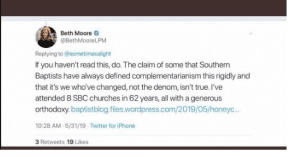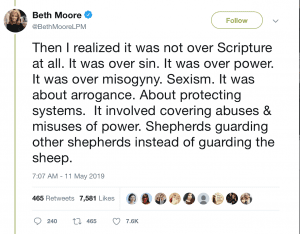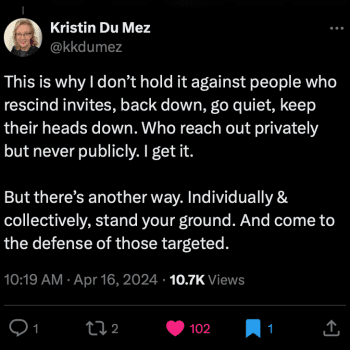 On Sunday, June 2, the world buried Rachel Held Evans.
On Sunday, June 2, the world buried Rachel Held Evans.
She was 37 years old and died, very unexpectedly.
Like so many others, I remember the moment I found out she was gone. I was tying my shoes, about to go walking with a friend, when my husband told me. We are very domestic on Saturday mornings—he reads the news while I make the waffles. So he saw the post first, and for a few seconds, everything stopped.
I didn’t know Rachel Held Evans. I had never met her. I had never exchanged tweets with her. Yet her voice had become a regular part of my world. She had a brilliant mind, a beautiful writing style, and a fierce devotion to the gospel. In one of her many moving testaments about the Christian faith, she wrote, “We could not become like God, so God became like us. God showed us how to heal instead of kill, how to mend instead of destroy, how to love instead of hate, how to live instead of long for more. When we nailed God to a tree, God forgave. And when we buried God in the ground, God got up.”
Her words connected with people. Her wit combined with her penetrating analysis of American Evangelicalism launched her into stardom—from a journalist and a blogger in 2008 to a New York Times Bestseller by 2012. As Emma Green wrote in the Atlantic, Rachel Held Evans “was part of a vanguard of progressive-Christian women who fight to change the way Christianity is taught and perceived in the United States…Evans helped forge new space for diverse voices who are denied authority or power” in traditional Christianity.
And people were hungry for what she had to say.
So when her voice stopped speaking on April 14, 2019, the world heard the silence. And when we learned she would never speak again, that silence became painful. Hundreds of people packed into a church in Chattanooga on Saturday June 1 to tell her goodbye; thousands more watched the service stream online. The benediction for her death contained her own words about life: “Jesus invites us into a story bigger than ourselves and our imagination, yet we all get to tell that story with the scandalous particularity of this moment and this place. We are storytelling creatures because we are fashioned in the image of a storytelling God…May we never lose our love for telling the story.”
Sadly, those words ending her benediction–taken from her last book and her last blog–signaled another end: the end (of at least the earthly part) of Rachel Held Evans’ story.
It was only later that day that I realized something very ironic. As we said goodbye to Rachel Held Evans, a champion for women preaching and teaching in American Evangelicalism, a fight about women preaching in Southern Baptist Churches was being lost on twitter.
Let me explain.
As anyone who has been reading the Anxious Bench knows, since 2016, Beth Moore has been calling out misogyny and sexism in the church. I have written about a lot of this, as well as Chris Gehrz and Kristin DuMez.
Things got really exciting again when, on May 31, Beth Moore tweeted and deleted the following statement: “If you haven’t read this, do. The claim of some that Southern Baptists have always defined complementarianism this rigidly and that its we who’ve changed, not the denom, isn’t true. I’ve attended 8 SBC churches in 62 years, all with a generous orthodoxy.” She linked to this tweet an article by Roy Honeycutt, former president of Southern Seminary in Kentucky ousted by the Conservative Resurgence in 1992. The article outlined why Southern seminary supported women as preachers.
In a seemingly orchestrated response which Wade Burleson describes as “cyber bullying,” white male leaders from the SBC ganged up on twitter against Beth Moore. Tom Ascol asked, “Why was [Moore] so excited about promoting Honeycutt on women in ministry? This is a serious concern about where the SBC is headed.” Al Mohler tweeted, “We have reached a critical moment in the Southern Baptist Convention when there are now open calls to retreat from our biblical convictions on complementarianism and embrace the very error that the SBC repudiated over 30 years ago. Honestly, I never thought I would see this day.” Owen Strachan retweeted Mohler’s tweet, adding, “Dr. Mohler is right. With sadness and alarm, we are in a critical moment. Yet God reigns. By his grace, the sacred fire of the Resurgence will not go out on our watch. An army of Southern Baptists love the truth, winsomely preach the truth, and will never abandon the truth.”
Beth Moore deleted her Roy Honeycutt tweet (from the cyberbullying, wrote Wade Burleson).
Then, on the morning of June 1–the day we buried Rachel Held Evans– Strachan tweeted Beth Moore’s retraction from the day before. In her statement given to the SBC Voices, Beth Moore admitted she was still a soft complementarian–which means she supports male headship and does not support women as pastors and elders. On her own twitter account, she told everyone to chill out. As she wrote, “Troubled brothers, try to relax. I do not see a female takeover on the horizon. Have some herbal tea.”
Almost in unison, the “SBC boys” tweeted their relief. As Owen Strachan wrote on June 1, “I am thankful to see this statement from Beth Moore. I take her at her word.”
The battle was won. Unlike in Game of Thrones, the kingdom (capitol city) was saved. Complementarianism still reigns in the Southern Baptist Convention, and the SBC queen still supports it.
To say the least, I was disappointed.
Yet, I also had an interesting idea. First, the benediction for Rachel Held Evans had reminded me of her quote that we are all storytellers–especially her reminder that we each tell the story from our own perspective (and, as a professional historian, I have to add that this is history 101). As I read through the relevant tweets and public statements, I clearly saw how the story Beth Moore was telling differed from the story Strachan et. al. was telling…..Second, I remembered a brilliant post published by Kristin DuMez during the 2016 election–Donald Trump and Hilary Clinton, By Their Words. It analyzed the speech patterns of Donald Trump and Hilary Clinton.
So I decided to take a page from Kristin’s book. I copied all of the twitter posts of Beth Moore, Al Mohler, Owen Strachan, and Denny Burke relevant to this recent conversation on women preaching, along with the two most relevant articles (Beth Moore’s open letter and Owen Strachan’s Patheos blog), and dumped them into the digital text visual analysis tool Voyant. I removed the most common repeating words (stop words like and & the, and the words women/woman & man/men since these were repeated so often by all that they skewed the analysis). Then I pressed reveal.
This is what I saw:
Here is the textual analysis of the SBC crowd:
Here is the textual analysis of Beth Moore:
Do you see what I see?
The most common words used by Beth Moore are: Christ, love, attitudes, accepted, serve, respect, know, misogyny, alongside, asking, sake, scripture, good, want, challenges, say, bible, serving, sexism, leaders, etc.
The most common words used by Strachan and his ilk are: church, teaching, word, order, headship, authority, scripture, teach, preach, called, leadership, design, gathered, says, rules, biblical, exercise, etc.
They are both talking about the same subject. But Beth Moore is concerned about Jesus, love, service; how misogyny has hurt the gospel of Christ. Owen Strachan, Al Mohler, and Denny Burke, in contrast, are concerned about hierarchical structures, maintaining order, authority, and who gets to be in charge.
By their words, complementarianism is about hierarchy, authority, and power. It always has been about power, it always will be about power. How Owen Strachan and Al Mohler responded to Beth Moore clearly shows this. Beth Moore threatened their power hierarchy and they were afraid.
 Jesus told us in Matthew 20 that the quest for power was the exact opposite of his message. “The rulers of the Gentiles lord it over them, and their high official exercise authority over them. Not so with you. Instead, whoever wants to become great among you must be your servant, and whoever wants to be first must be your slave…”
Jesus told us in Matthew 20 that the quest for power was the exact opposite of his message. “The rulers of the Gentiles lord it over them, and their high official exercise authority over them. Not so with you. Instead, whoever wants to become great among you must be your servant, and whoever wants to be first must be your slave…”
Don’t back down, Beth Moore, because you are right.
It isn’t about Scripture. It is over sin. It is over power. It is over misogyny, sexism, arrogance. It is about protecting systems. It does involve covering abuses & misues of power. It is about shepherds guarding other shepherds instead of guarding the sheep.
Patriarchy (ahem, complementarianism) is about the quest for power, and it has given birth to misogyny, abuse, oppression, even slavery.
Calling patriarchy complementarianism doesn’t make it Christian. It just makes it patriarchy with a new name. Gerda Lerner wrote that patriarchy is simply a system in which “men hold power in all the important institutions of society and women are deprived of access to such power.” Sort of like the Southern Baptist Convention? I think Beth Moore’s tweet is rather insightful. “Do not be deceived. If it walks like a duck and quacks like a duck”…it is probably a duck. .
.














